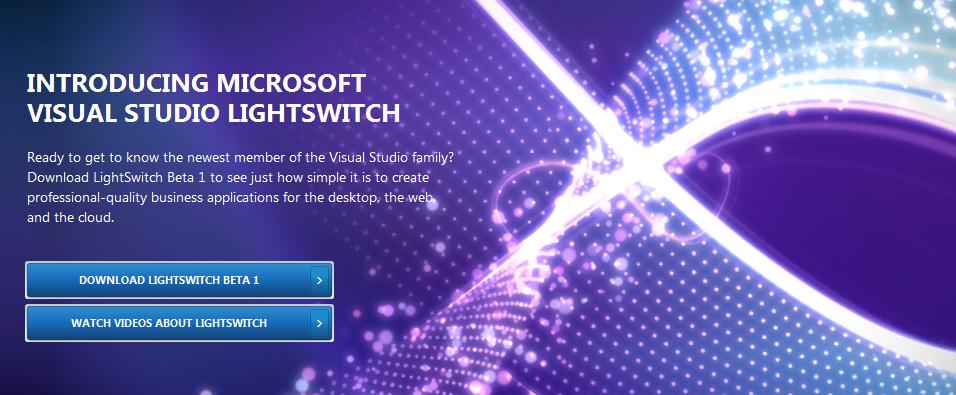Microsoft has announced a new product called Microsoft Visual Studio LightSwitch, which the company claims is the simplest way to build business applications for the desktop and cloud. LightSwitch is a new member of the Visual Studio family focused on making it easy to develop line-of-business applications. Jason Zander, corporate vice president for Visual Studio at Microsoft, says, at their core, "most end-user business applications combine two things: data plus screens." LightSwitch is optimized around making these two things very simple. LightSwitch is a tool which allows you to create Line of Business (LoB) applications by using a visual tool, similar to Microsoft Access, although LightSwitch can also produce applications for the web and can pull data from various sources instead of its own build-in database.

What puzzles me with LightSwitch is: what's the target audience? Who is supposed to use this tool instead of another tool? Is this a tool to sell more Sharepoint licenses, more Azure licenses? I have no idea. The main problem is that there's some friction in the image of LightSwitch. Microsoft says LightSwitch is aimed at the tech-savvy non-developer who wants to create a LoB application without needing to hire a truck full of professional developers. In short: a tool for an amateur who wants to 'Do It Him/Herself'. The friction is in the level of knowledge a person apparently has to have: what's a database, what's a table, what's an entity, what's a screen, what's validation etc. So is it really an amateur tool for amateurs or is it an amateur tool for professionals?
The applications that are produced by LightSwitch have an advanced architecture and can be further developed using Visual Studio 2010. This not your fathers two tier fat client. Better bone up on your architecture.
"Visual Studio LightSwitch is a new tool aimed at easily building data-driven applications, such as an inventory system or a basic customer relationship management system."
Typically, when making difficult things easy, the price is solving a set of very difficult technical problems. In this case, the LightSwitch engineering team needed to remove the necessity for non-programmer domain experts to think about application tiers (e.g., client, web server, and database) when constructing data-bound applications for use in their daily business lives. LightSwitch is designed for non-programmers, but it also offers the ability to customize and extend it, which will most likely be done by experienced developers (see Beth Massi's Beyond the Basics interview to learn about some of the more advanced capabilities).
This conversation isn't really about how to use LightSwitch (or how to extend it to meet your specific needs)—that's already been covered. Rather, in this video we meet the architects behind LightSwitch, Steve Anonsen and John Rivard, focusing on how LightSwitch is designed and what problems it actually solves as a consequence of the design. Most of the time is spent at the whiteboard, discussing architecture and solutions to some hard technical problems. This is Going Deep, so we will open LightSwitch's hood and dive into the rabbit hole.
QUICKLY CREATE PROFESSIONAL-QUALITY BUSINESS APPLICATIONS
With LightSwitch, you can build custom applications that rival off-the-shelf solutions. Get a head start by using pre-configured screen templates that give your application a familiar look and feel. LightSwitch also provides prewritten code and other reusable components to handle routine application tasks, along with helpful step-by-step guidance. However, if you need to write custom code, you can use Visual Basic .NET or C#. You can deploy to the desktop, browser, or cloud (post-Beta) to share your application with others more easily without the cumbersome installation processes.
Jay Schmelzer: Introducing Visual Studio LightSwitch
EASILY ACCESS EXISTING SYSTEMS AND DATA
Applications created with LightSwitch support exporting data to Microsoft Office Excel for fast and easy sharing and reporting. You can also attach your application to existing data sources, which makes it easy to collect, analyze, and reuse information from a variety of data sources including Microsoft SQL Server, Microsoft SQL Azure, SharePoint, Microsoft Office Access (post-Beta), and other third-party data sources.
BUILD FOR TODAY, PREPARE FOR TOMORROW
With LightSwitch you can create custom applications for the way you do business. Keep your technology and business options open, while building a practical yet scalable application that matches your current needs now and in the future. The pre-built templates and components in LightSwitch are fully extensible, so you can get the specific functionality your application demands. In addition, your application can grow to meet the increasing demands of popular applications using the Microsoft Windows Azure Cloud Hosting option.
Summary
Visual Studio LightSwitch is a new tool aimed at building data-driven applications, like an inventory system or a basic customer relationship management system incredibly easy. LightSwitch is addition to Visual Studio targeting to cloud development inside enterprise. You can do time tracking application, with easy inventory. Light Switch can used twice in a month just for update your data and everybody can do this without any problems, because it is easy. New platform lightswitsh help to focusing on business task and you have to make minimal choice for using this tool. LightSwitch automatically generates the user interface in Silverlight for a data source and, with no code, you can create, read, update and delete data. Watch the demos and see how you can build, customize, and extend LightSwitch applications including changing themes, templates, adding custom validation, providing smart data types, and deploying to Windows Azure.
